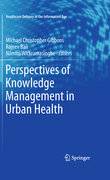
Perspectives of knowledge management in urban health
Gibbons, Michael Christopher
Bali, Rajeev
Wickramasinghe, Nilmini
It is a tragic paradox of American health care: a system renowned for world-class doctors, the latest medical technologies, and miraculous treatments has shocking inadequacies when it comes to the health of the urban poor. Urban Health Knowledge Management outlines bold, workable strategies for addressing thisdisparity and eliminating the “knowledge islands” that so often disrupt effective service delivery. The book offers a wide-reaching global framework for organizational competence leading to improved care quality and outcomes for traditionally underserved clients in diverse, challenging settings. Its contributors understand the issues fluently, imparting both macro and micro concepts of KM with clear rationales and real-world examples as they: Analyze key aspects of KM and explains their applicability to urban health. Introduce the KM toolsand technologies most relevant to health care delivery. Offer evidence of therole of KM in improving clinical efficacy and executive decision-making. Provide extended case examples of KM-based programs used in Washington, D.C. (child health), South Africa (HIV/AIDS), and Australia (health inequities). Apply KM principles to urban health needs in developing countries. Discuss new approaches to managing, evaluating, and improving delivery systems in the book’s “Measures and Metrics” section. Urban health professionals, as well as health care executives and administrators, will find Urban Health Knowledge Management asignificant resource for bringing service delivery up to speed at a time of great advancement and change. Nontechnical, accessible treatment of knowledge management and healthcare delivery written for healthcare professionals and administrators rather than IT professionals. First book to apply knowledge management concepts to urban health problems. Generalizes lessons learned from the urban health context to public health and healthcare delivery at large, both atthe national and international level. INDICE: Section I KM and Urban Health.- Chapter 1: Knowledge Management for the Urban Health Context.- Chapter 2: Healthcare Knowledge Management: Incorporating the Tools, Technologies, Strategies and Processes of KM to Effect Superior Healthcare Delivery.- Chapter 3: Knowledge Management in the Urban Health Context: Moving Towards Tacit-to-Tacit Knowledge Transfer.- Section II Incorporating KM Principles into Urban Health Contexts.- Chapter 4: A Childhood / Adolescent Knowledge Management System for Urban Area Health Programs in the District of Columbia.- Chapter 5: Urban Health in Developing Countries.- Chapter6: A Pervasive Wireless Knowledge Management Solution to Address Urban HealthInequalities with Indigenous Australians.- Chapter 7: The Development of a Framework to Evaluate the Management of HIV/AIDS Programmes in Rural and Urban South Africa.- Chapter 8: The potential of Serious Games for Combating Health Inequalities.- Section III Measures and Metrics for KM and Urban Health.- Chapter 9: A Scaleable and Viable Strategy for Managing Organizing: Typology for Intervening into Complex Healthcare Environments for Enhancing Continual Development.- Chapter 10: Amplifying Resonance in Organizational Learning Process: Knowledge Sharing for Overcoming Cognitive Barriers and for Assuring Positive Action.- Chapter 11: Developing New Urban Health Metrics to Reduce the Know-Do Gap in Public Health.- Chapter 12: Recommendations on Evaluation and Development of Useful Metrics for Urban Health.- Chapter 13: Making Sense of Urban Health Knowledge
- ISBN: 978-1-4419-5643-9
- Editorial: Springer
- Encuadernacion: Cartoné
- Páginas: 200
- Fecha Publicación: 27/09/2010
- Nº Volúmenes: 1
- Idioma: Inglés
